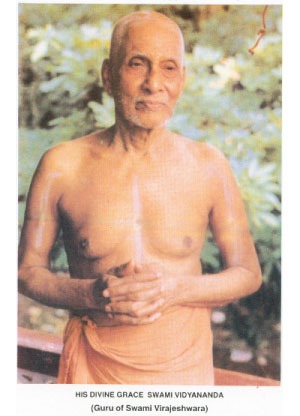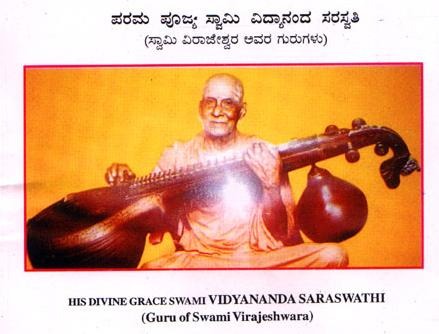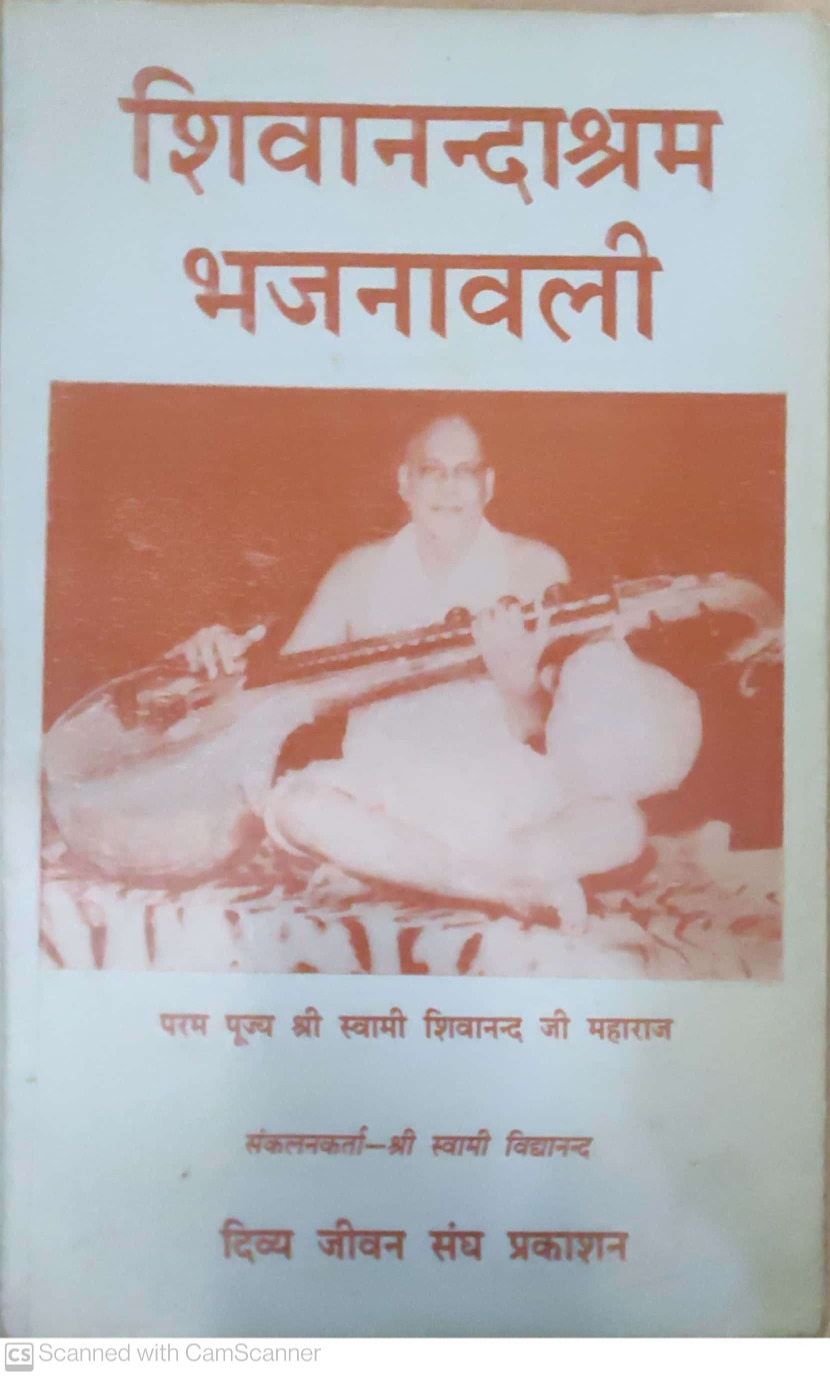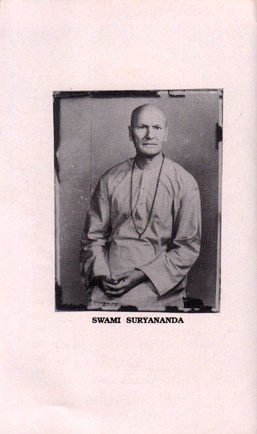We prostrate to Sadguru Vidyanandaji who destroyed the blinding darkness in our heart with the light of Jana.
His Divine grace Swami Vidyanandaji of Rishikesh, our most revered Gurudeva, one among the great living sages of the present age, attained Mahasamadhi and become Brahma-lina at a very auspicious moment on Friday, the
7th April 2000 at 9:05 am.
Born in pious and religious family in
Kerala in the year
1914 and known as Ramanathan, he was the second son among 2 brothers and five sisters. At the age of eight, he went on along pilgrimage with his mother for three years, all over India, during which period he received the blessings of many Siddha purushas and holy saints. His Holiness
Shri Chandrasekhara Bharati Swaminah - Jagadguru Sankaracarya, the then
Jagadguru Shankaracharya of Sringeri Peetham and imbibe saintly qualities from Him, which laid foundation for his future development into a sage himself. The young Ramanathan was very good at singing Bhajans at every gathering.
After a brief business career, he went to Chidambaram, in Tamilnadu where he met his
music guru Sri P. Srinivasa Iyer, a Naishthika Bramhachari (lifelong celibate), Brahma Jnani and a saintly soul. He taught him the basics of Vina for 12 days and then asked him to practice on his own. But, the Guru's power and grace was so great that he not only mastered the subtle art but also could connect music with the philosophy of
Vedanta. Pleased by the disciple's acumen, and in order to help this young student to support his large family, Sri Srinivasa Iyer put him in the
music department of the cinema field, in which our Ramanathan worked for nearly
25 years, in Bombay and Madras, and directed music for many films. This was more a period of Spiritual Sadhana under the guidance of the saintly music teacher than of earning money.
When the family burden was getting over he became a member of the
Divine Life Society In 1950. In 1954 on the hearing the news of Maha samadhi of the Saint Sri Chandrasekara Bharati Swaminah at Sringeri, for whom he had the greatest respect, he ran to Rishikesh along with his music Guru in revulsion to worldly life to
Sivananda Ashram. Swami Sivanandaji asked him to stay here permanently and said that he had been praying to Goddess Saraswati to send a person knowing Vina music. However, he went back to Madras to complete the music contracts in the movies and other pending works and finally joined the
Sivananda Ashram in Rishikesh in 1956. On the holy
Guru Purnima day of the same year, Swami Sivanandaji gave him Sannyasa and named him
Swami Vidyanandaji Saraswati , an apt name for a maestro in Vina and devotee of Goddess Saraswati.
Swami Vidyanandaji taught music, Bhajans and Keertans on the Veena to many in the Ashram as an integral part of his Sadhana. He held an
early morning Bhajan class and an afternoon class in his own room, everyday in which interested inmates as wel as visitors joined with great enthusiasm and derived much needed peace and solace. His feelingful Bhajans and mastery in Veena had endeared him to countless visitors, who made an annual visit to the ashram, primarily to recharge themselves with the divine vibrations in his musical Bhajan class. His Bhajans were a treat to the souls. Many are the foreign students who were enchanted by his soulful songs that wished to take him to their countries and even got his passport ready, But, he was very happy and contented with his simple life of Bhajan, Kirtan and in Brahmakara Vritti with study of Vedanta in his own room, on the banks of Holy Ganga, in the lap of Himalayas, in the holy Ashram of Sri Gurudev, keeping himself in continuous remembrance of the Lord. He often went in to a trance while playing onVina, which he adored and worshiped as a manifestation of Goddess Saraswati. Chandogyopanisad(1-7-6) says: Those that sing on Vina sing the glory of Bhagavan.
During the last couple of years or so, through he was
physically incapacitated and appeared to be suffering to onlookers, mentally he was totally
detached from the body and its aliments, he was always peaceful, in bliss of being one with Brahma. Even in this state many have found peace by attending his Bhajans, by talking to or merely by being in his presence. Through Physical aliments in one from or another confined him to bed and obstructed him in helping others in their Sadhana, internally his Sadhana was more intense, as it afforded an opportunity to be established in Braahmi, advaita state, for most of the time. The sickness was a blessing in disguise, as Swamisri often referred to it, because he never monad , complained against, or shrunk from, or expressed displeasure of suffering. Instead, willing he underwent what was providentially brought to hear upon him. Mentally detached from the body he watched it as an observer while the devotees took care of the body. He had absolutely no desire either to keep or to give up the body, either to suffer or not to suffer. Only the ego has desires and attachments to the body; when the ego completely dissolved , there are no desires, good or bad, beneficial or detrimental. Good and bad, pain and pleasure all had become Brahma swaroopa for him.
His divine Grace did exactly the same by remembering Bhagava Krishna and repeating OM., in the very last moment. Gurudeva, Swami Vidyanandaji, was reposing after the Bhajan session and morning coffee and talking cheerfully with devotees. One devotee, who had served him sincerely for long, out of compassion, quipped '
We shall not pray to Kanhaia (Krishna) any more. He is making you suffer so much. He is merciless. We shall forget his name and stop praying any more."
"No, no" " Swamisri shouted back."
Don't forget him. Keep repeating His name all the time." "But how to keep? He slips away, and we forget him" replied the devotee. "
Keep Him bound in your heart. Tie him down" ( like His mother Yashoda did in his childhood)" and sing Jai, Jai ,Jai to Him". Then suddenly he raised his voice and loudly pronounced "Om Ram, Om Ram, Om Ram, Om Ram four times, Swami breathed his last.
गुरुदेव, स्वामी विद्यानन्दजी, भजन सत्र और सुबह की चाय के बाद सुखपूर्वक विश्राम कर रहे थे और भक्तों के साथ खुशी से बातचीत कर रहे थे। एक भक्त, जिसने बहुत समय से सेवा की थी, उसने कहा, 'हम और अब कान्हैया (कृष्ण) से प्रार्थना नहीं करेंगे। वह आपको इतना दुख दे रहा है। वह निर्दयी है। हम उसका नाम भूल जाएंगे और अब और प्रार्थना नहीं करेंगे।
''नहीं, नहीं,' स्वामी श्री ने जवाब दिया। 'उसे भूल मत जाओ। हर समय उसका नाम जारी रखो।' 'लेकिन कैसे रखें? वह चला जाता है और हम उसे भूल जाते हैं,' भक्त ने कहा। 'उसे अपने हृदय में बंधित रखो। उसे बाँध लो' (जैसे उसकी मां यशोदा ने उसकी बचपन में की थी) और उसे जय जय जय गाओ।' तभी वह अपनी आवाज उठाते हुए कहा, 'ॐ राम, ॐ राम, ॐ राम, ॐ राम' चार बार, और स्वामी ने अपनी आखिरी सांस ली।



